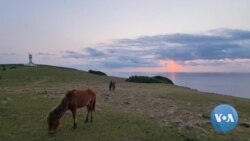Visiting a Japanese island on the frontlines of China-Taiwan tensions.
Welcome to VOA Asia Weekly. I'm Chris Casquejo in Washington. That story is just ahead, but first, making headlines:
U.S. and South Korea marine corps on Wednesday conducted their first large-scale amphibious landing exercises in five years. About 30 naval vessels, 70 aircraft and 50 armored vehicles took part. Pyongyang has accused the U.S. and South Korea of rehearsing for an invasion with their joint military exercises.
North Korea unveiled what it claimed are new and smaller nuclear warheads, and vowed to produce more weapons-grade nuclear material to expand its arsenal, according to a state news report.
The military-appointed election commission in Myanmar ordered the dissolution of the political party led by ousted leader Aung San Suu Kyi. State television said the National League for Democracy was one of 40 parties that failed to register by a Tuesday deadline for a planned general election, which critics have denounced as a sham. Suu Kyi is serving prison sentences totaling 33 years after being convicted in a series of prosecutions brought by the military.
Alibaba founder Jack Ma has returned to China, ending a more than year-long stay overseas. Ma retreated from public view after criticizing China’s financial regulators in 2020. Some regarded his comments as the catalyst for Beijing’s wide-ranging regulatory crackdown on tech entrepreneurs.
Taiwan’s president Tsai Ing-wen left Wednesday for a transit stop in the U.S. on the way to official visits to the Central American countries of Guatemala and Belize. She is expected to meet U.S. House Speaker Kevin McCarthy next week. China, which claims the self-governing island as its own territory, threatened retaliation if she met McCarthy while in California.
As Japan lifts its postwar military restraints, perhaps nowhere is feeling the change more than the remote island of Yonaguni. Located just over 100 kilometers from Taiwan, the tiny Japanese island is slowly being transformed into a military outpost. Many residents are concerned about getting caught in the conflict between China and Taiwan. VOA’s Bill Gallo visited Yonaguni and has this report.
Sunrise on one of Japan's most remote, and beautiful, islands.
Here on Yonaguni Island, wild native horses roam free along rugged coastlines.
This is so far from the rest of Japan, sometimes it feels untouched by humans.
The few who are here enjoy a serenity hard to find in other parts of the country.
But trouble is just over the horizon.
“Where I’m standing is the westernmost point in Japan. Taiwan is right behind me. It’s so close that in fact Taiwan is visible on a clear day.”
That has brought problems. During U.S.-China tensions last year, a Chinese missile that flew over Taiwan landed just 80 kilometers from Yonaguni.
For fishermen who make their living in those waters, it was unsettling.
“Missile launches can’t always be 100% accurate — it’s a human activity. So it’s very frightening. Almost all the fishermen here are afraid.”
Taiwan isn’t the only danger. Yonaguni is also close to a group of islands claimed by both Japan and China.
Kotaro Kobari often fishes for tuna near the disputed islands, which have seen more Chinese patrols.
“Recently, they chase you. They follow you. They approach you. The Chinese coast guard, I think. It’s outrageous.”
For Yonaguni, the tensions have brought big changes.
In 2016, a military base was established here, mainly for surveillance.
Soon, Japan will bring missiles – part of a broader military buildup in historically pacifist Japan.
Fumie Kano was born and raised in Yonaguni. Even if a war broke out, she says she wouldn’t leave.
“I’d die on this island if it came to that. It’d be terrible. I love this island. I want to live here forever… I’m angry at this policy that could ruin our lives.”
But with a declining population, many residents welcome any economic help.
Bill Gallo. VOA News. Yonaguni Island, Japan.
Visit voanews.com for the most up-to-date stories. Thanks for watching VOA Asia Weekly. I’m Chris Casquejo. Until next week.
We leave you now with the cherry blossoms in Washington, DC. The cherry trees were a gift from Japan in 1912.











